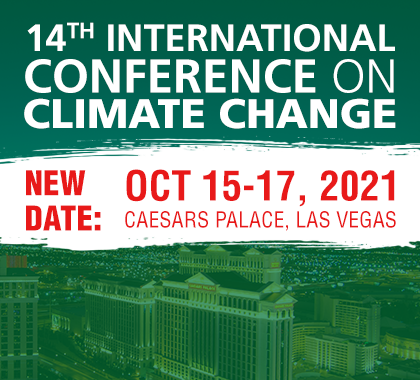The Heartland Institute is hosting the 14th International Conference on Climate Change (ICCC-14) at Caesars Palace, in Las Vegas, Nevada.
Approximately 50 of the top experts from the fields of climate science, energy economics, and public policy will present their current research concerning climate change and the likely effects of policies proposed to prevent it.
The theme of the ICCC-14 is “The Great Reset: Climate Realism vs. Climate Socialism.” It responds to the push by international leaders to exploit the supposed existential threat of climate change to, in the words of Klaus Schwab, founder and executive chairman of the World Economic Forum, to “reimagine capitalism.” As described in numerous documents and discussions, the aim of those pushing the Great Reset is to impose socialism on the global economy, especially energy production and use.
The conference begins with with an opening dinner Friday October 15 and wraps up with a screening of the movie, “Climate Hustle 2,” followed by a reception with filmmaker Marc Morano and others on Sunday October 17.
Exchange of Ideas
The conference is a forum allowing scholars to exchange of ideas and research without fear of censure by climate activists and alarmists in the mainstream media, says James Taylor, president of The Heartland Institute, which publishes Environment & Climate News.
“ICCC-14 provides a venue for realist scientists to meet with each other, energize each other, lift each other’s spirits, and discuss current and future research,” said Taylor.
The Keynote speakers include, William Happer, Ph.D., professor emeritus in the Department of Physics at Princeton University, and founding board member of the CO2 Coalition; Lord Christopher Monckton, one-time special Advisor to British Prime Minister Margaret Thatcher; and Patrick Moore, Ph.D., a co-founder of Greenpeace who currently serves as director at the CO2 Coalition, and as a senior fellow at The Heartland Institute.
Among the other speakers at the conference are climate scientists Neil Frank, Ph.D., Madhav Khandekar, Ph.D., Patrick Michaels, Ph.D., and Willie Soon, Ph.D; economists and statisticians, Kevin Dayaratna, Ph.D., Ross McKitrick, Ph.D., and Benjamin Zycher, Ph.D.; and non-profit advocates for the poor and minorities E. Calvin Beisner, Ph.D. and Derrick Hollie.
Is Reset Necessary?
The Heartland Institute hosted a series of livestream events with a number of ICCC-14 speakers giving a preview of their presentations.
Among those participating were Roy Spencer, Ph.D. a principal research scientist for the University of Alabama in Huntsville, and Amy Oliver Cooke is the CEO of the John Locke Foundation in North Carolina.
Spencer’s research indicates there is no need for a “Great Reset,” to reduce emissions of greenhouse gases, as they are on a path to decline as industries adopt more efficient, lower emitting technologies naturally.
“The goal of the IPCC is that if we reduce CO2 emissions, this will keep warming to 1.5 degree Celsius in the future,” said Spencer in his online preview. “But what our results suggest, as well as those of Lewis and Curry–which were published in 2018–is that maybe we don’t even have to make any changes and we might meet that 1.5-degree goal without doing massive transitions from fossil fuels to wind and solar, which … would be hard to do from a practical standpoint.”
“Now it could be that there are other natural warming influences beside El Nino and La Nina–we simply do not know, so that’s a big assumption in all of this–how much warming is natural–we don’t know,” Spencer said.
Nuclear Is Climate Friendly
Natural gas and nuclear energy are far more climate and ratepayer friendly than renewable power, like wind and solar, said Cooke in her presentation titled, “Want to Go Green? Then You Need to Go Nuclear.”
“Here I am in North Carolina, which produces a significant amount of electricity from nuclear energy,” Cooke said. “North Carolina has actually done remarkably well in reducing emissions over the last decade-plus because they have switched from coal to natural gas.
“So the combination of the nuclear power with the fuel switch from coal to natural gas is one that really helped North Carolina reduce emissions,” said Cooke. “Here’s sort of the spoiler alert for all of this: If people really want low-carbon emissions from the electricity sector and you still want to live in the 21st Century, North Carolina has been doing this and showing the rest of us how to do it with affordable, reliable, environmentally friendly nuclear energy plus natural gas. It is that simple.”
Kenneth Artz (KApublishing@gmx.com) writes from Dallas, Texas.


























